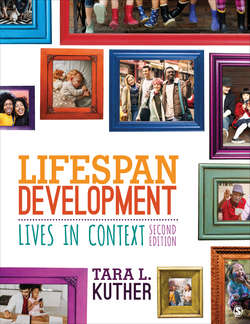Читать книгу Lifespan Development - Tara L. Kuther - Страница 66
На сайте Литреса книга снята с продажи.
Social Learning Theory
ОглавлениеLike behaviorists, Albert Bandura (1925–) believed that the physical and social environments are important, but he also advocated for the role of thought and emotion as contributors to development. According to Bandura’s social learning theory, people actively process information—they think and they feel emotion—and their thoughts and feelings influence their behavior. The physical and social environment influences our behavior through their effect on our thoughts and emotions. For example, the teenager who breaks his curfew and is met by upset parents may experience remorse, which may then make him less likely to come home late in the future. In this example, the social environment (a discussion with upset parents) influenced the teen’s thoughts and emotions (feeling bad for upsetting his parents), which then influenced the teen’s behavior (not breaking curfew in the future). In other words, our thoughts and emotions about the consequences of our behavior influence our future behavior. We do not need to experience punishment or reinforcement to change our behavior (Bandura, 2012). We can learn by thinking about the potential consequences of our actions.
In a classic study conducted by Albert Bandura, children who observed an adult playing with a bobo doll toy roughly imitated those behaviors, suggesting that children learn through observation.
Albert Bandura
One of Bandura’s most enduring ideas about development is that people learn through observing and imitating others, which he referred to as observational learning (Bandura, 2010). This finding suggests that children who observe violence rewarded, such as a child grabbing (and successfully obtaining) another child’s toy, may imitate what they see and use aggressive means to take other children’s toys. People also learn by observing the consequences of others’ actions. A child observer might be less likely to imitate a child who takes another child’s toy if the aggressor is scolded by a teacher and placed in time-out. Observational learning is one of the most powerful ways in which we learn.
Bandura has also contributed to the field of lifespan human development through the concept of reciprocal determinism, according to which individuals and the environment interact and influence each other (Bandura, 2011). In contrast with behaviorist theorists, Bandura viewed individuals as active in their development rather than passively molded by their physical and social environments. Specifically, development is a result of interactions between the individual’s characteristics, his or her behavior, and the physical and social environment (see Figure 1.5).
Description
Figure 1.5 Bandura’s Model of Reciprocal Determinism
As an example, consider how a particular person’s characteristics might influence that person’s behavior and the surrounding social environment. Suppose Issac is an excitable person, which makes him quick to debate with others. This behavior, in turn, stimulates those around him to engage in debate. But suppose, too, that Issac’s behavior (being quick to debate) does not result only from his personal characteristics (excitability). It is also influenced by the environment (e.g., being surrounded by smart people who enjoy debating), and it influences the environment (e.g., people who enjoy debating are more likely to talk to Issac, while people who avoid debating are less likely to talk to him). This is an example of the complex interplay among person, behavior, and physical and social environment that underlies much of what we will discuss throughout this book.
Behaviorist theories have made important contributions to understanding lifespan human development. Classical and operant conditioning and social learning are powerful means of explaining human behavior at all ages. Concepts such as observational learning, reinforcement, and punishment hold implications for parents, teachers, and anyone who works with people. Social learning theory and reciprocal determinism offer a more complex explanation for development and behavior than do behaviorist theories. We will revisit these concepts in later chapters.
Jean Piaget (1896–1980) believed that children’s drive to explore and understand the world around them propels them through four stages of cognitive development.
Bill Anderson / Science Source
